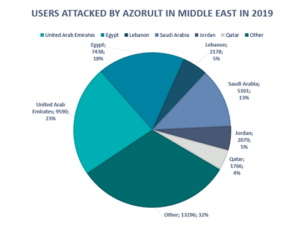
In a world where privacy is heavily fought for, VPN services play an important role by enabling additional data protection and safe internet browsing.
Yet cybercriminals try to abuse the growing popularity of VPNs by impersonating them,
as is the case in this AZORult campaign. In the most recent campaign, the attackers created a copy a VPN service’s website,
which looks exactly the same as the originalwith the only exception being a different domain name
Links to the domain are spread through advertisements via different banner networks,
a practice that is also called ‘malvertizing’. The victim visits the phishing website and is prompted to download a free VPN installer. Once a victim downloads a fake VPN installer for Windows,
it drops a copy of AZORult botnet implant. As soon as the implant is ran, it collects the infected device’s environment information and reports it to the server. Finally,
the attacker steals cryptocurrency from locally available wallets (Electrum, Bitcoin, Etherium, and others), FTP logins, and its passwords from FileZilla,
email credentials, information from locally installed browsers (including cookies), credentials from WinSCP,Pidgin messenger and others.
Upon the discovery of the campaign, Kaspersky immediately informed the VPN service in question about the issue and blocked the fake website.
“This campaign is a good example of how vulnerable our personal data is nowadays. In order to protect it, users need to be cautious,
and be especially careful when surfing online.
This case also shows why cybersecurity solutions are needed on every device.
When it comes to phishing copies of websites,
it is very difficult for the user to differentiate between a real and a fake version. Cybercriminals often capitalize on popular brands and this trend is not likely to die down”, comments Dmitry Bestuzhev,
head of GReAT in Latin America.
“We strongly recommend using VPN for protection of data exchange on the web,
but it is also important to closely study where the VPN software is downloaded from.”
Kaspersky detects this threat as HEUR:Trojan-PSW.Win32.Azorult.gen
To reduce the risk of infection with Trojan stealers such as AZORult, Kaspersky recommends users to:
- Check if the website is authentic. Do not visit websites until you are sure that they are legitimate and start with ‘https’. Confirm that the website is genuine by double-checking the format of the URL or the spelling of the company name, reading reviews about it and checking the domain’s registration data before starting downloads
- Store cryptocurrencies in cold wallets (ones that are not connected to the internet) to minimize risks of funds being stolen
- Try to keep your passwords and other personal information, including a wallet’s Kaspersky Password Manager private key, in a password manager – like.
- The application securely stores your data in an encrypted private vault.
- Use a reliable security solution, such as Kaspersky Total Security, , which protects devices from a wide range of threats, including phishing activity.
 التكنولوجيا وأخبارها بوابة مصر لأخبار تكنولوجيا المعلومات والإتصالات وفي أفريقيا كما تعتبر مصدر رئيسي للمعلومات حول تكنولوجيا المعلومات والاتصالات والفرص الاستثمارية المرتبطة بالاقتصاد الرقمي في المنطقة بالكامل
التكنولوجيا وأخبارها بوابة مصر لأخبار تكنولوجيا المعلومات والإتصالات وفي أفريقيا كما تعتبر مصدر رئيسي للمعلومات حول تكنولوجيا المعلومات والاتصالات والفرص الاستثمارية المرتبطة بالاقتصاد الرقمي في المنطقة بالكامل







